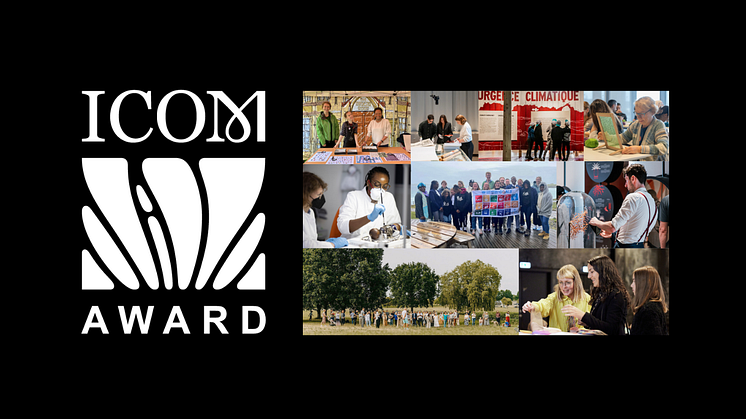
Press release -
Leading the future: Winner of the ICOM Award for Sustainable Development Practice in Museums announced
Dubai, UAE - 14 November
In a landmark moment for the global museum sector, the International Council of Museums (ICOM) has announced the “Shared Island Stories Between Scotland and the Caribbean: Transnational Youth Exchange” project submitted by the Barbados Museum & Historical Society (BMHS) as the winner of the inaugural ICOM Award for Sustainable Development Practice in Museums. Jamie Allan Brown and Kaye Hall accepted the ICOM Award on behalf of the wider project team. Shared Island Stories has addressed interconnected sustainable development challenges such as the climate emergency, coastal erosion, at-risk youth, heritage decline, and economic instability in island communities. The award, presented at the 27th ICOM General Conference in Dubai, recognises museums leading the change in addressing the world's most pressing challenges through the framework of the United Nations 2030 Agenda for Sustainable Development.
Selected from 130 projects across 60 countries, the winning initiative demonstrates how cultural institutions are reimagining their role in building a sustainable future and how the project actively contributes to the UN Sustainable Development Goals. The entries have been judged by an international jury of 7 museums and sustainable development experts, on the basis of the five dimensions of Agenda 2030 and the Sustainable Development Goals, namely the 5 P’s: People, Planet, Prosperity, Peace and Partnership.
"As we face global challenges—from climate crisis to social inequality—museums must be part of the solution. The ICOM Award for Sustainable Development Practice in Museums celebrates institutions that have answered this call with creativity, courage, and concrete action. The winner, selected from an extraordinary field of 130 projects spanning 60 countries, proves that cultural institutions can drive meaningful change while fulfilling their core mission of preservation and education. It is through initiatives such as the ICOM Award that we incite museums to think differently about their role and their impact within society. It is just the beginning of a transformation that will reshape museums for generations to come." – stated Emma Nardi, ICOM President, during the ICOM Award ceremony at the ICOM General Conference in Dubai.
Along with the four finalists: Ghent city museum (STAM) in Belgium, Museums Association of Namibia, National Gallery of Victoria in Australia, and Ars Aevi Museum of Contemporary Art in Sarajevo, these institutions demonstrate through their projects the very best of what museums can achieve when they commit to the principles of sustainable development.
" The inaugural ICOM Award received a large number of submissions from all corners of the globe, showcasing a diverse range of approaches to the 5ps (People, Planet, Prosperity, Peace and Partnership) and 17 Sustainable Development Goals. This overwhelming response is a testament to the unwavering commitment of ICOM's global membership to the UN Agenda 2030's mission of 'leave no-one behind'. These submissions are a reminder too, of the significant impact individual museums can have - far beyond their own communities - as integral parts of ICOM's global knowledge network. The diversity of approach can inspire fellow museum practitioners and institutions to make major contributions to addressing the most pressing issue of our time: the transition to a just, sustainable future for all. Moreover, the submissions also demonstrate the many pathways in which museums can become agents of change. Rather than solely raising awareness of sustainability, they can develop and test sustainable practices, transforming themselves into workshops for a fairer and more democratic future. This is a powerful argument for integrating culture into sustainable development plans everywhere." said Morien Rees, Chair of the ICOM Award Jury.
With the establishment of the award, ICOM aims to create a global repository of best practices, inspire cultural institutions and museums on their way to adopt sustainable development practices, and demonstrate that museums are essential partners in achieving the 2030 Agenda for Sustainable Development.
Related links
Topics
Categories
|
About the International Council of Museums (ICOM) The International Council of Museums (ICOM) is an international organisation of museums and museum professionals which is committed to the research, conservation, continuation and communication to society of the world’s natural and cultural heritage, present and future, tangible and intangible. As a network of experts, comprising over 60 000 professionals in 139 countries and territories, ICOM makes recommendations on issues related to cultural heritage, promotes capacity building and advances knowledge. ICOM is the voice of museum professionals on an international stage and raises public cultural awareness through global networks and co-operation programmes. ICOM is the only global organisation in the museum field. |







